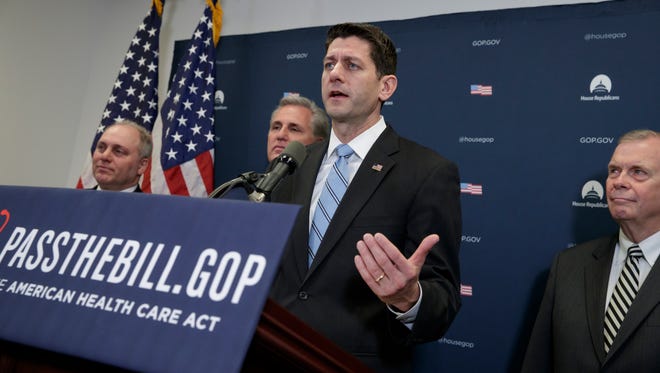GOP should slow down and rethink health bill: Andy Slavitt
'We ran on repealing and replacing Obamacare' won't cut it when costs rise and coverage is lost.

Exactly seven years ago Thursday, after decades of effort to make health care available to all Americans, the Affordable Care Act was signed into law. Now, in what House Speaker Paul Ryan calls “an act of mercy,” the House is planning an anniversary vote to repeal it and, in addition, to radically alter the Medicaid program that has been a staple of the national safety net since the 1960s. For members of Congress, this is one of the most consequential votes they might ever face.
For millions of people, the Affordable Care Act has meant access to regular medical care for the first time. And for tens of millions more, the ACA protects us against being denied insurance because of a pre-existing medical condition or because we reached a lifetime cap.
A few years ago, I came from the private sector to lead the implementation of the ACA after it got off to a rocky start. And I can say that while it’s not perfect, the ACA set us on a course of record progress in cost, quality and access to care and changed the lives of millions of people, many of whom I heard from every day.
In comparison, the American Health Care Act (AHCA) pending in the House drives up the cost of individual insurance by an estimated 15% to 20% next year, according to the non-partisan Congressional Budget Office, and higher for older and rural Americans, to levels that can reach half of their income or more. About 24 million Americans would become uninsured over the next decade, including 7 million who get insurance through their employers. Medicaid funding would be cut by 25%, with hard caps put in place by the federal government. That would effectively ration care for millions of low- and moderate-income Americans, from needy children to seniors in long-term care facilities.
As more details play out publicly, the sponsors of the bill race against the clock. Unlike the ACA, which was debated vigorously in both houses of Congress with 79 hearings in the House alone, repealing the ACA and replacing it with the AHCA has put House members in a difficult position of casting a vote with many unanswered questions.
The $6,500 question on health care: Column
Mitch McConnell: Middle class families are counting on Trump
The first and perhaps most obvious question is what will be the impact of the law on your district? Estimates are that over 10 years, 55,000 people in each congressional district will lose their coverage. And if you’re in a district with rural counties or older people, it could be much higher. Because Medicaid would be slashed by $880 billion, and that money flows to states and then directly to hospitals, physician practices, social workers and nursing homes, what would be the resulting impact on the community, on the opioid crisis, on employment?
Quite aware of all the potential harm in this bill, Speaker Ryan has said not to worry — there will be a “second” and “third” phase that will fix everything. It's right to question how much stock to place in this. It’s a bit like your teenager bringing home an F in math but telling you not to worry because he’s sure he will get an A on the next test.
Yet it's not clear there will be other tests, as these phases would depend on newfound bipartisanship and the questionable use of executive authority. Rep. Raul Labrador, R-Idaho, isn’t convinced, calling it “a fiction for anyone to believe that.”
As representatives watch senator after senator declare they won’t vote for the bill without significant improvements, it’s right for some in the House to question why they are being asked to take such a difficult vote.
POLICING THE USA: A look at race, justice, media
Our health care plan for America: Paul Ryan
This will very likely be one of those votes that becomes harder to explain in retrospect, particularly if the results are as bad as it looks like they will be. The American Medical Association and a slew of other physician groups, along with nurses and hospital groups, patient groups and the AARP, are loudly warning of dire consequences for millions of Americans if the bill passed. Lawmakers will have a difficult time reverting to “but we ran on repealing and replacing Obamacare” as justification at election time, as the AHCA’s coming higher deductibles and higher premiums are likely not what voters had in mind.
I experienced these past few years what it’s like when one party is entirely responsible for carrying out the law, and I don’t recommend it to my Republican colleagues. As gratifying as it was to make progress, it was infinitely harder without support from the other side of the aisle.
As we reach the seventh year of a law that has done so much — but without the bipartisan collaboration the nation has needed — the best question for your member of Congress is when is it time to slow down, abandon an ill-conceived bill, and reach across the aisle for a bipartisan solution?
Andy Slavitt, a former health care industry executive, served as acting administrator for the Centers for Medicare and Medicaid Services from 2015 to 2017. Follow him on Twitter: @ASlavitt
You can read diverse opinions from our Board of Contributors and other writers on the Opinion front page, on Twitter @USATOpinion and in our daily Opinion newsletter. To respond to a column, submit a comment to letters@usatoday.com.